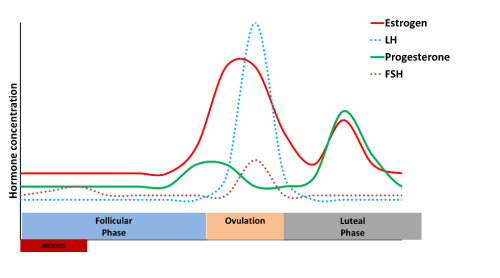Editors note: This article is part our #ChoosetoChallenge21 series. In this series we are asking people to identify issues they think need changing, explain why, and what needs to be done. This series is a mix of strategic thinking and historical perspectives to more human issues, like this one.
BLUF: I #ChooseToChallenge the education male leaders in Defence are (not) given about a woman’s menstrual cycle in order to better serve our Servicewoman and ultimately our organisation.
There is a distinct lack of formal education and subsequent understanding of what women and their bodies go through in different stages of their menstrual cycle. Danielle Smith identified this lack of knowledge as well. I am by no means an expert, but I have become more aware of the physiological changes that happen whilst studying a degree in sports, fitness and coaching. This education has meant that I have become more understanding and empathetic towards the issue’s women face, of which they have no control over. Not every cycle is the same and the way each woman deals with the physiological process they go through each month is different. This directly impacts their performance output. Health is a leadership issue and Defence needs to improve its education about it to enable leaders to take responsibility.
A change in annual training would be welcomed and would certainly be a step in the right direction.
In the short term, there is an opportunity to incorporate this education in annual military training. Studies have shown in elite athletes that hormonal fluctuations throughout their menstrual cycle have negatively affected their exercise training and performance capacity. In the medium and long term, Defence should be conducting their own research on how menstrual cycles have and do effect Servicewomen, this can feed into Defence policy of how we can get the best for and out of our Servicewomen at different stages of their cycle. This does not mean we move exercises or stop collective training to cater for a woman going through their Follicular phase. But it could mean that we, as leaders in Defence, are more empathetic to their individual situation and acknowledge the extra stressors that their bodies may be going through. It means that we understand that their body naturally increases in temperature during the Luteal phase, and we can look to monitor this more closely. It means that we understand that there is an increase in Progesterone in a women’s body in the Luteal phase and that means we should monitor their liquid intake and ensure that they stay hydrated, as an example – the same way junior commanders monitor the water intake of their soldiers when working in hot environments.

A change in annual training would be welcomed and would certainly be a step in the right direction. However, there may still be a say-do-gap when it comes to understanding how to best serve Servicewomen during the different stages of their menstrual cycle.
The problem is two-fold; first is we need our Servicewomen to be comfortable to approach their chain of command to discuss this topic. It’s extremely personal and can be sensitive and emotive, particularly when we start to incorporate the complexities of family planning. And particularly when approaching a predominately male chain of command. We need our Servicewoman to have the courage to talk and for men to have the courage to listen.
The second is that we need our Servicemen to be properly educated and prepared to have these conversations. They need to know that the menstrual cycle affects every woman differently and changes month to month. What might work for one Servicewoman may not work for another. It cannot be a one-size-fits-all approach. This requires our Servicemen to encompass high Emotional Intelligence when addressing the impact that this has on our Servicewomen.
#ChoosetoChallenge
To conclude, we all have a part to play when understanding the physiological demands that are placed on our Servicewomen at different parts of their menstrual cycle. As a male in the Infantry, there is much for us to learn about the effects on a woman’s mental and physical wellbeing during her cycle. We need to challenge a culture that doesn’t prepare us to serve our subordinates through natural health issues.
If we become better educated we better serve our Servicewoman and ultimately our organisation. This problem does not just sit with the education of our Servicemen but also requires our Servicewomen to have the courage to approach the chain of command when they need to.

Ryan Robertson
Ryan Robertson is a Warrant Officer in the British Army with experience in training, operations and planning. He is currently studying a part-time degree in Sports, Fitness and Coaching through The Open University.

